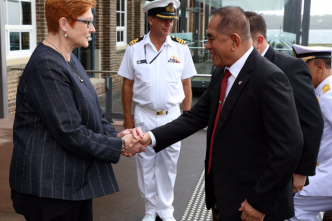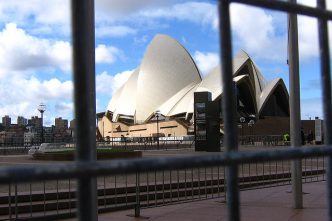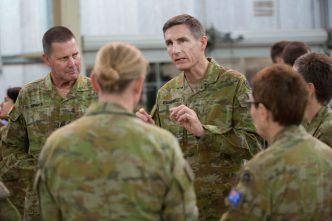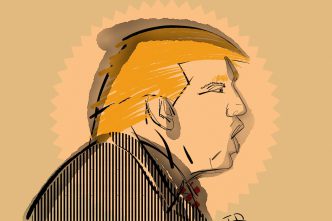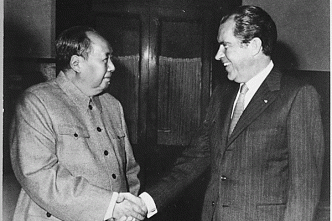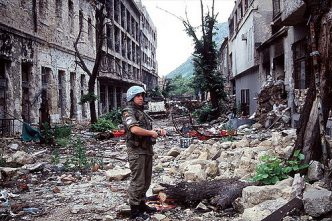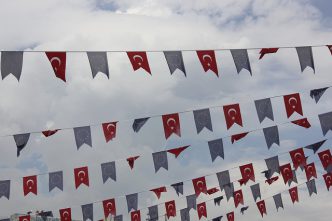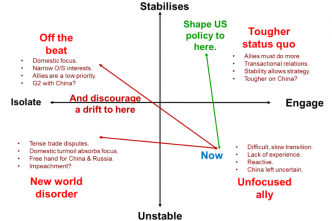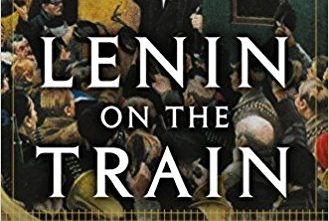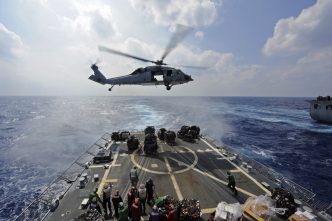Last week Indonesian defence minister, Ryamizard Ryacudu, met with his Australian counterpart, Marise Payne, for the annual Indonesia–Australia Defence Ministers’ meeting. On the face of it, defence relations between Indonesia and Australia seem to be …
Australia has invested significantly in counterterrorism (CT) policy, capabilities and operations since the 11 September 2001 attacks. These efforts saw continuing success in 2016, with the country remaining free of major attacks despite a persistent high …
This article is part of a series on ‘Women, Peace and Security’ that The Strategist is publishing in recognition of International Women’s Day 2017. Lieutenant General Angus Campbell, the first Special Forces officer to command the Australian …
It really does make a difference who occupies the White House. Acknowledging that point seems beyond many commentators and policymakers in Australia. Yet, failing to recognise how important individuals can be may leave allies floundering …
The Beat Police eyes in UK skies Police in England are advertising for a ‘drone manager’ to supervise the first 24-hour drone unit to operate in the UK. The drones, which have been trialled since …
Since last November, many of Washington’s closest allies and partners have been in a virtual state of panic over the impetuous and unpredictable President Trump. But on a recent trip to India we found that …
It’s tempting to dismiss Trump’s election as a bizarre aberration of the digital age—a triumph of celebrity over reason. But it’s also clear that Trump succeeded because he appealed to voters on issues long ignored …
The US Department of Justice has charged four Russians—two intelligence officers and two private hackers—with over 47 counts of computer crime, fraud and identity theft, for their role in the compromise of over one billion …
European Union leaders have suddenly awoken to new realities in the Balkans. At a recent summit, they emphasised the need for increased EU engagement to maintain stability—and to push back against Russian influence—in the region. …
Australia is now the last member of the Five Eyes Alliance to commence the process of replacing the venerable—but now obsolete—Browning Hi Power (BHP) as its primary military handgun. After entering service in 1935, the …
Countries, coalitions, organisations and communities across the world put enormous effort into countering terrorism. Much of that work is done out of the spotlight, in legislatures, police forces, policy departments, security agencies, social services, academia …
Screaming newspaper headlines in Europe, Turkey and the United States suggest that Turkish-European relations are on an irreversible downward slide. They imply that not only has Turkey lost interest in its prospective membership of the …
Sea State In its biggest show of naval force in the Asia–Pacific since WWII, Japan has unveiled plans to send its largest warship—the Izumo helicopter carrier—on a three-month tour of the South China Sea, kicking …
2016 was a tumultuous year in cyber security. But there were three stories in particular that will likely have implications for events this year. The first is Russia’s cyber influence campaign that helped Donald Trump …
Russian Foreign Minister Sergey Lavrov said something startling last month at the Munich Security Conference. He rejected, explicitly, the so-called ‘liberal world order’, asserted that ‘the post-Cold War order’ had come to an end and …
At ASPI’s recent State of the Region Masterclass (PDF) I detailed some “alternate futures” for the Trump administration. In truth no-one, not even Trump himself, can be sure how his presidency will evolve. The future …
The great Russian writer, Vladimir Nabokov, probably described VI Lenin best, when he observed that the Bolshevik leader’s ideology was like a pail of milk of human kindness, with a dead rat at the bottom. …
In a recent Strategist post, we discussed the pros and cons of different sized unmanned maritime aerial systems. We came down on the side of larger systems. Geoff Slocombe then took issue with our position, …
There is a growing consensus that the first genuine crisis of Donald Trump’s presidency could involve North Korea and, more specifically, its ability to place a nuclear warhead on one or more ballistic missiles possessing …
The Foreign Policy White Paper to be produced this year must place big bets in Asia. The multi-purpose bets must imagine expanded interests and seek insurance against a protectionist US president who’s sceptical of alliances. In our …


